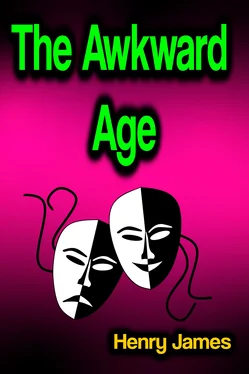I may say at once that this had seemed to me, under the first flush of recognition, the good mark for the pretty notion of the "free circle" put about by having, of a sudden, an ingenuous mind and a pair of limpid searching eyes to count with. Half the attraction was in the current actuality of the thing: repeatedly, right and left, as I have said, one had seen such a drama constituted, and always to the effect of proposing to the interested view one of those questions that are of the essence of drama: what will happen, who suffer, who not suffer, what turn be determined, what crisis created, what issue found? There had of course to be, as a basis, the free circle, but this was material of that admirable order with which the good London never leaves its true lover and believer long unprovided. One could count them on one's fingers (an abundant allowance), the liberal firesides beyond the wide glow of which, in a comparative dimness, female adolescence hovered and waited. The wide glow was bright, was favourable to "real" talk, to play of mind, to an explicit interest in life, a due demonstration of the interest by persons I qualified to feel it: all of which meant frankness and ease, the perfection, almost, as it were, of intercourse, and a tone as far as possible removed from that of the nursery and the schoolroom—as far as possible removed even, no doubt, in its appealing "modernity," from that of supposedly privileged scenes of conversation twenty years ago. The charm was, with a hundred other things, in the freedom—the freedom menaced by the inevitable irruption of the ingenuous mind; whereby, if the freedom should be sacrificed, what would truly BECOME of the charm? The charm might be figured as dear to members of the circle consciously contributing to it, but it was none the less true that some sacrifice in some quarter would have to be made, and what meditator worth his salt could fail to hold his breath while waiting on the event? The ingenuous mind might, it was true, be suppressed altogether, the general disconcertment averted either by some master-stroke of diplomacy or some rude simplification; yet these were ugly matters, and in the examples before one's eyes nothing ugly, nothing harsh or crude, had flourished. A girl might be married off the day after her irruption, or better still the day before it, to remove her from the sphere of the play of mind; but these were exactly not crudities, and even then, at the worst, an interval had to be bridged. "The Awkward Age" is precisely a study of one of these curtailed or extended periods of tension and apprehension, an account of the manner in which the resented interference with ancient liberties came to be in a particular instance dealt with.
I note once again that I had not escaped seeing it actually and traceably dealt with—(I admit) a good deal of friendly suspense; also with the nature and degree of the "sacrifice" left very much to one's appreciation. In circles highly civilised the great things, the real things, the hard, the cruel and even the tender things, the true elements of any tension and true facts of any crisis, have ever, for the outsider's, for the critic's use, to be translated into terms—terms in the distinguished name of which, terms for the right employment of which, more than one situation of the type I glance at had struck me as all irresistibly appealing. There appeared in fact at moments no end to the things they said, the suggestions into which they flowered; one of these latter in especial arriving at the highest intensity. Putting vividly before one the perfect system on which the awkward age is handled in most other European societies, it threw again into relief the inveterate English trick of the so morally well-meant and so intellectually helpless compromise. We live notoriously, as I suppose every age lives, in an "epoch of transition"; but it may still be said of the French for instance, I assume, that their social scheme absolutely provides against awkwardness. That is it would be, by this scheme, so infinitely awkward, so awkward beyond any patching-up, for the hovering female young to be conceived as present at "good" talk, that their presence is, theoretically at least, not permitted till their youth has been promptly corrected by marriage—in which case they have ceased to be merely young. The better the talk prevailing in any circle, accordingly, the more organised, the more complete, the element of precaution and exclusion. Talk—giving the term a wide application—is one thing, and a proper inexperience another; and it has never occurred to a logical people that the interest of the greater, the general, need be sacrificed to that of the less, the particular. Such sacrifices strike them as gratuitous and barbarous, as cruel above all to the social intelligence; also as perfectly preventable by wise arrangement. Nothing comes home more, on the other hand, to the observer of English manners than the very moderate degree in which wise arrangement, in the French sense of a scientific economy, has ever been invoked; a fact indeed largely explaining the great interest of their incoherence, their heterogeneity, their wild abundance. The French, all analytically, have conceived of fifty different proprieties, meeting fifty different cases, whereas the English mind, less intensely at work, has never conceived but of one—the grand propriety, for every case, it should in fairness be said, of just being English. As practice, however, has always to be a looser thing than theory, so no application of that rigour has been possible in the London world without a thousand departures from the grim ideal.
The American theory, if I may "drag it in," would be, I think, that talk should never become "better" than the female young, either actually or constructively present, are minded to allow it. THAT system involves as little compromise as the French; it has been absolutely simple, and the beauty of its success shines out in every record of our conditions of intercourse—premising always our "basic" assumption that the female young read the newspapers. The English theory may be in itself almost as simple, but different and much more complex forces have ruled the application of it; so much does the goodness of talk depend on what there may be to talk about. There are more things in London, I think, than anywhere in the world; hence the charm of the dramatic struggle reflected in my book, the struggle somehow to fit propriety into a smooth general case which is really all the while bristling and crumbling into fierce particular ones. The circle surrounding Mrs. Brookenham, in my pages, is of course nothing if not a particular, even a "peculiar" one—and its rather vain effort (the vanity, the real inexpertness, being precisely part of my tale) is toward the courage of that condition. It has cropped up in a social order where individual appreciations of propriety have not been formally allowed for, in spite of their having very often quite rudely and violently and insolently, rather of course than insidiously, flourished; so that as the matter stands, rightly or wrongly, Nanda's retarded, but eventually none the less real, incorporation means virtually Nanda's exposure. It means this, that is, and many things beside—means them for Nanda herself and, with a various intensity, for the other participants in the action; but what it particularly means, surely, is the failure of successful arrangement and the very moral, sharply pointed, of the fruits of compromise. It is compromise that has suffered her to be in question at all, and that has condemned the freedom of the circle to be self- conscious, compunctious, on the whole much more timid than brave—the consequent muddle, if the term be not too gross, representing meanwhile a great inconvenience for life, but, as I found myself feeling, an immense promise, a much greater one than on the "foreign" showing, for the painted picture of life. Beyond which let me add that here immediately is a prime specimen of the way in which the obscurer, the lurking relations of a motive apparently simple, always in wait for their spring, may by seizing their chance for it send simplicity flying. Poor Nanda's little case, and her mother's, and Mr. Longdon's and Vanderbank's and Mitchy's, to say nothing of that of the others, has only to catch a reflected light from over the Channel in order to double at once its appeal to the imagination. (I am considering all these matters, I need scarce say, only as they are concerned with that faculty. With a relation NOT imaginative to his material the storyteller has nothing whatever to do.)
Читать дальше












